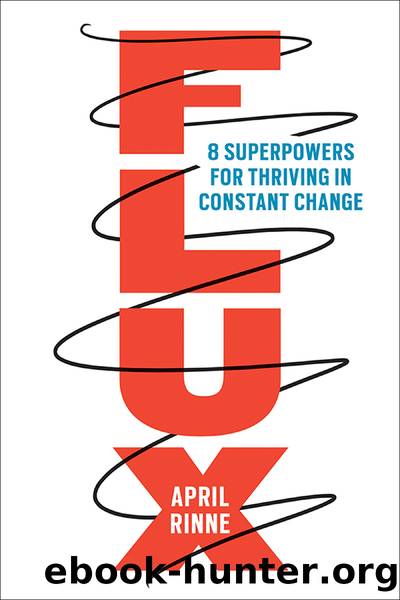Flux: 8 Superpowers for Thriving in Constant Change by April Rinne

Author:April Rinne [Rinne, April]
Language: eng
Format: epub
ISBN: 9781523093595
Google: PaUOzgEACAAJ
Publisher: Berrett-Koehler
Published: 2021-11-15T23:47:08.735929+00:00
Leading with the old script in hand, you might answer this question in terms of more: maximize profits, create a bigger company, have a bigger house, or build a big yacht. But this would be woefully out of touch.
Leadership with the new script and a Flux Mindset would answer in terms of paying everyone enough, ensuring everyone feels safe and valued, and treating others as peers rather than subordinates.
Go back to your legacy. When youâre gone, people wonât remember whether you had âmore.â They will remember how you treated them.
In 2018, visionary architect Kevin Cavenaugh gave a TEDx talk titled âHow Much Is Enough?â87 In it, he noted that Milton Friedman won the Nobel prize in economics in 1976 for, among other things, espousing the notion that greed is good. Yet, Kevin wondered, what might have happened if a leader with Toba Betaâs perspective (âgreed is a little bit more than enoughâ) had won the Nobel prize back then instead, and weâd spent the past forty-plus years building an economy that both values innovation and technology and also ensures we rise together with enough?
Forty years later, we are witnessing the effects of this short-sightedness. In our quest for growth, profits, efficiency, and âmore,â weâve been blind to (or simply looked away from) the impacts on relationships, inequity, and inequality. While weâve kept marketing departments busy and earnings reports in line, weâve sold consumers (or, better word: humans) short.
Kevin puts it this way: âAs a property developer, one approach to rent is to make as much money as possible out of every square foot. I call these properties âgreedy buildings.â Another approach is to ensure housing for all. This means creating beautiful, affordable buildings that humans love to inhabit and are enough to meet their needs. This is the legacy I want to leave.â88
Itâs not that Kevin doesnât care about money or profitability. Quite the opposite. But the lens through which he views these things is rooted in enough, which makes a profound difference.
In both Kevinâs and my own experience, if youâre not having a conversation about enough, then youâre leaving value (including money!) on the table. And hereâs why:
Conversations about more tend to focus on transactions: how to do more deals, monetize more interactions, and make more money. The time frame is short: the sooner money can be made, the faster you can cash out. In this world, people are consumers: they are mere means to a monetized end. There is no genuine care for their well-being beyond their ability to pay.
Conversations about enough, on the other hand, center on relationships: how to cultivate lifelong friendships, build sustainable and human-centric enterprise, and nourish the planet. The time frame is long: this is about lifetime leadership and evergreen legacies, with humanity at the core.
Leading with the old script and a âmoreâ mindset treats relationships as transactional. Monetizing relationships can kill them outright (at best, it saps them of meaning).
Leading with enough means nurturing relationships above all else: not for money, but for their inherent and often incalculable value.
Download
This site does not store any files on its server. We only index and link to content provided by other sites. Please contact the content providers to delete copyright contents if any and email us, we'll remove relevant links or contents immediately.
Zero to IPO: Over $1 Trillion of Actionable Advice from the World's Most Successful Entrepreneurs by Frederic Kerrest(4572)
Machine Learning at Scale with H2O by Gregory Keys | David Whiting(4313)
Never by Ken Follett(3957)
Harry Potter and the Goblet Of Fire by J.K. Rowling(3858)
Ogilvy on Advertising by David Ogilvy(3622)
Shadow of Night by Deborah Harkness(3368)
The Man Who Died Twice by Richard Osman(3080)
Book of Life by Deborah Harkness(2939)
The Tipping Point by Malcolm Gladwell(2925)
Will by Will Smith(2920)
Purple Hibiscus by Chimamanda Ngozi Adichie(2855)
0041152001443424520 .pdf by Unknown(2846)
My Brilliant Friend by Elena Ferrante(2831)
How Proust Can Change Your Life by Alain De Botton(2814)
How to Pay Zero Taxes, 2018 by Jeff A. Schnepper(2655)
Hooked: A Dark, Contemporary Romance (Never After Series) by Emily McIntire(2555)
Rationality by Steven Pinker(2366)
Can't Hurt Me: Master Your Mind and Defy the Odds - Clean Edition by David Goggins(2342)
Borders by unknow(2315)
